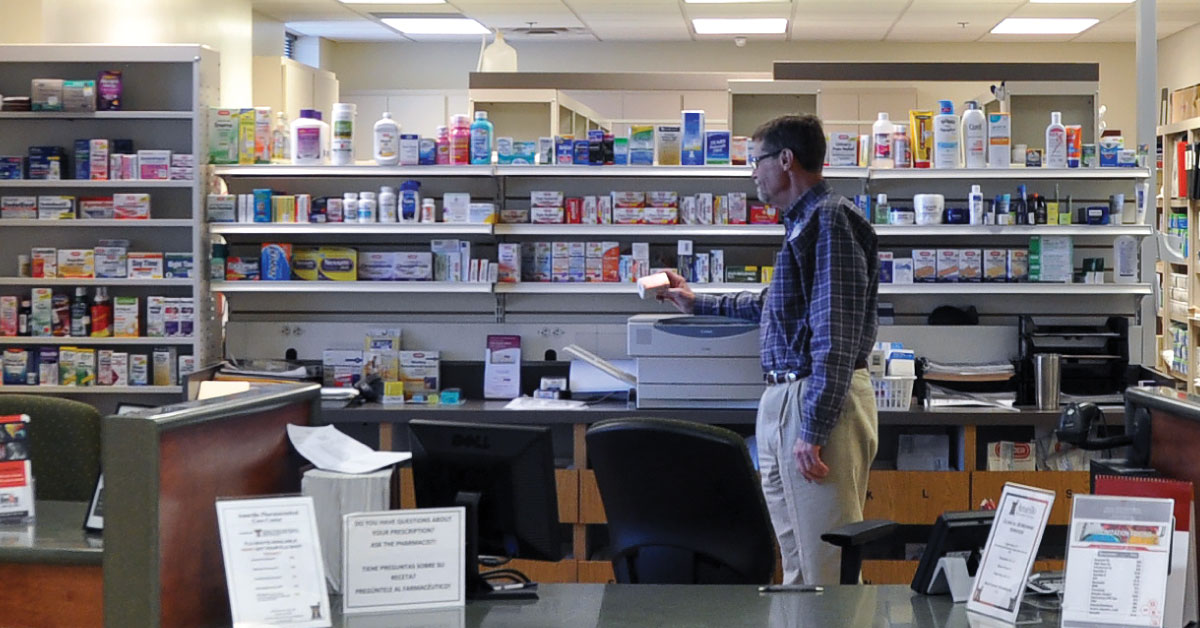TTUHSC pharmacists give update on how pharmacies are handling pandemic changes.

Amarillo Pharmaceutical Care Center
The COVID-19 pandemic is pushing our healthcare workers to their limits across the country as we see countless stories of heroism on the frontlines of an unprecedented event. An indispensable link in the chain of essential services is our pharmacies.
We spoke with David Simmons, R.Ph., a pharmacist who runs the Amarillo Pharmaceutical Care Center at the Texas Tech University Health Sciences Center (TTUHSC) campus in Amarillo, and Eric J. MacLaughlin, Pharm.D., professor and chair of the Department of Pharmacy Practice in the TTUHSC Jerry H. Hodge School of Pharmacy, about how pharmacies are handling the changes brought about by the pandemic and what the public needs to know regarding medications and supplies.
Getting Prescription Medications During COVID-19
Simmons tells us that the biggest change he’s seen is an understandable drop in foot
traffic inside the pharmacy as people practice social distancing and staying home.
This means that customers are choosing to have prescriptions mailed rather than picking
them up.
“People are being respectful of social distancing,” Simmons says. He encourages customers
to have their prescriptions mailed to their homes. However, if a medication is a controlled
substance, it will still require a signature in person.
Simmons also notes that the number of refills being requested is higher than for new
patients getting prescriptions, which is typically the other way around. Why? Patients
are deferring standard care at this time and using telehealth visits with their doctors.
This means fewer new prescriptions at the pharmacy.
Fortunately, neither Simmons nor MacLaughlin are aware of any serious shortages of
medications in the Texas Panhandle. Early on in the pandemic, customers stockpiled
over-the-counter medications like Tylenol and Motrin, they explained, but thankfully
that has eased.
Hydroxychloroquine
Simmons and MacLaughlin expressed concern surrounding the malaria drug hydroxychloroquine
and its effectiveness against COVID-19. One of the many concerns is that the drug
will not be available to those for whom it is designed, or for those who are already
using it.
“The supply of hydroxychloroquine wasn’t great before this started,” Simmons said.
Simmons has not seen a new patient come in with a hydroxychloroquine prescription
to treat COVID-19 symptoms.
The data on hydroxychloroquine is severely lacking in respect to its effectiveness
on COVID-19, MacLaughlin explained. The National Institutes of Health states that, “At present no drug has been proven to be safe and effective for treating
COVID-19.”
COVID-19: We’re In This Together
Simmons stresses that we’re all working through this pandemic together.
“We all have friends who are barbers, waiters, grocery store clerks. We all depend
on the economy for everybody else,” he said. “My staff and I are blessed that we have
jobs and can help people in the process.”
The TTUHSC Jerry H. Hodge School of Pharmacy is taking their help a step further:
MacLaughlin updated us in early April about his team designing viral transport media (VTM) testing vials for COVID-19 testing.
He tells us they are now making approximately 2,000 vials a week that have been shipped
all around the Texas panhandle.
As we continue to see day after day, we are surrounded by helpers and heroes. Men
and women who are willing to put their health and well-being at risk for others, for
strangers, for all of us.
With devoted professionals like Simmons, MacLaughlin and so many others showing their
care, ingenuity and expertise, patients will certainly continue to get the care and
medication they need.
As Mr. Rogers says, “Look for the helpers.”
Let’s look for the helpers and say “thank you.”
